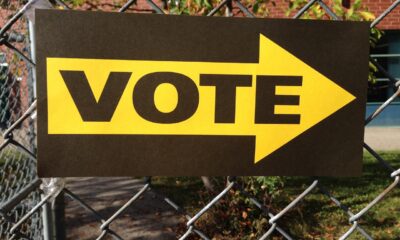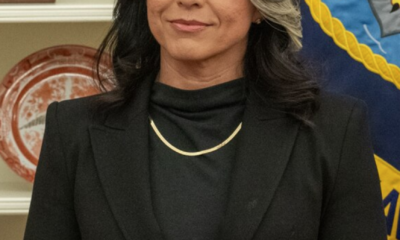Constitution
Independent voters – where do they stand?
Independent voters have one value only: they think Parties are political machines. Someone must educate them as to the importance of ideas.
Now that Election Season is in full swing, so-called independent voters are getting a lot of attention. Those who claim to speak for them, boast that they will decide the election. Whether that’s true or not, depends on where they stand. The problem is that independent voters don’t seem to stand anyplace in particular. “Reaching” them is strictly hit or miss, and reveals a fundamental problem with American education. In civics, economics, and even basic philosophy, no one seems to believe that basic truth exists. Dedicated efforts at promoting education in these areas is the only thing that will serve.
What do independent voters say?
That literally depends on whom you ask. The New Republic, one of many Voices of the Left, says there are no independent voters. Or at least, most of those who call themselves independent voters, aren’t. An independent voter, by their and many other definitions, owns no loyalty to either of the major Parties. But according to The New Republic, too many who call themselves independent voters, do lean toward one Party or the other in matters of policy.
Where they do not lean, is following either Party’s political machine. Since shortly after the War Between the States, Party politics has been machine politics, with patronage and other ills. Charles Guiteau assassinated newly elected President James A. Garfield because Garfield’s Party (Republicans) wouldn’t reward him as he expected. The very idea that anyone, let alone a megalomaniac like Guiteau, could ever feel he had “a right” to “expect” a reward like that, does stand as an indictment of Garfield’s times.
So if you do ask independent voters what they want, they’ll agree on one thing only. They seek an end to political machines. Even if they never heard of Charles Guiteau (few civics classes teach who assassinated Garfield, as they teach who assassinated Abraham Lincoln and who is suspected of assassinating John F. Kennedy), they feel that Parties are no more than big political machines. Occasionally the two machines cooperate to make sure only a machine player will get elected or appointed.
But beyond that…!
Beyond that, independent voters agree on nothing – except that neither Party should ever hold a “trifecta” of government. (The “trifecta” is control of the Presidency, the House of Representatives, and the Senate by one Party.) Ask them why not, and they’ll vaguely denounce “extremism.” The best politics, to them, is compromise politics, in which neither Party gets all it wants.
And why shouldn’t they feel that way? They despise both Parties equally. Remember: to independent voters, the two Parties are competing machines who occasionally make marriages of convenience. (Similarly, The Coca-Cola Company and the Pepsi Cola Company sign Calendar Marketing Agreements to trade-off placing their full-sized vending machines in convenience stores – and shut out all other “soft drink” bottlers.)
But independent voters forget that ideology does matter. Rank-and-file adherents to the major Parties understand something independent voters ignore: that civil politics is about ideas.
That’s why independent voters will never elect their own government. They have no ideas on which they all agree. Worse, they have imbibed the post-modern idea that no such thing as objective truth exists. This kind of thinking pervades sites like IndependentVoting.org that purport to speak for independents. They grandiosely speak of “the independent movement,” but have no idea what an “independent government” would look like. To paraphrase author Stephen King,
One always ends up wanting to gee while the other one wants to haw.
(“Gee” and “Haw” stand for “Turn right” and “Turn left” in dog sled lingo.)
How do independent voters see the rest of us?
Independent Voter News is the best source for that. Back in February they published “Ten Signs That Confirm You Are an Independent Voter.” Those “Ten Signs” confirm some confused thinking, which might or might not have justice or excuse – up to a point:
- Each side has some legitimate points – so neither has a “monopoly on truth.” Again, that follows from post-modernism’s denial of absolute truth.
- Terms like “liberal” and “conservative” are merely convenient “boxes.” Again, “no such thing as truth.”
- Both sides are hypocritical – and neither side has any legitimate reason to make exceptions.
- The two parties are both alike – meaning both lying.
- Nominations, general elections, district drawing, and the like need broad and “systemic” reform. What, they have no idea.
- True competition for voters does not exist.
- A class of voters exists whom neither Party represents.
- Voters ought to sample a wide variety of sources for news and commentary.
- Voters must carefully study the positions of all candidates, then evaluate them, apart from Party.
- The class of independent voters likely includes you anyway, according to surveys.
What does all that really mean?
The “Ten Signs” article justifies each point with examples of the worst message failings of the two Parties. For example, concerning Sign Three, they criticize the Democrats for:
- Rigging their Presidential primary system so that challengers to the incumbent haven’t a chance. (The author probably was apoplectic to watch Kamala Harris walk away with a nomination by acclamation when Joe Biden quit.)
- Rendering the New Hampshire Democratic Primary meaningless.
All very well. But in criticizing the Republican Party, they cite leftist political theorists – including the Department of Political Science at Yale University. “Limited government is a myth!” say the Yalies. (Your editor has every right to criticize those people; he holds a Yale degree.) Their criticism of “all talk [and no action]” on “cutting government waste” has some validity. But until they settle on what functions government ought to serve, and ought not serve, their criticism lacks validity.
This goes to their basic problem. Without absolute truth, they judge each side’s position as just as good as the other’s. One might as well put the sum of two plus two up for debate! To take the Yale position on limited government: that source sees a legitimate purpose in government programs that serve the interests of the slothful (“welfare”), the envious (progressive taxation), and the lustful (taxpayer coverage of abortion).
The latest example
The best – or maybe worst – example of the muddle-headed thinking of one aspiring to lead independent voters to some kind of nonpartisan paradise is Greg Orman, former independent candidate for Governor of Kansas. The last entry on his web site – literally – was an op-ed on July 28, 2020. From then on, he has been writing exclusively for RealClearPolitics.
Until his most recent article, his writing mostly reflected a “neutral observer” pose on the Election of 2024. Shortly after Christmas he said whichever Presidential candidate sought to win independent voters must show himself capable of:
rejecting extremism, reaching across the aisle, and having adult conversations with [independent voters].
There you have a perfect example of postmodern, “there is no truth” thinking.
Extremism in defense of liberty is no vice. And moderation in pursuit of justice is no virtue. Sen. Barry Goldwater (R-Ariz.) accepting the Republican nomination for President in 1964
If that source provokes fear, uncertainty, or doubt, consider another:
[W]hen a long train of abuses and usurpations, pursuing invariably the same Object evinces a design to reduce them under absolute Despotism, it is their right, it is their duty, to throw off such Government, and to provide new Guards for their future security. Thomas Jefferson, Declaration of Independence
So the only way extremism is always vicious is if people suffering the “long train of abuses and usurpations” must suffer on.
Last month, after the first assassination attempt against Donald Trump, Robert F. Kennedy Jr. suspended his campaign and endorsed Trump. Orman, apoplectic, cried that Kennedy had “betray[ed]” “the values held by many independents.” Trump promised to address Kennedy’s signature issue: the conspiracy of Big Pharma to make Americans sick and keep them sick. Trump also promised Kennedy a position of authority to investigate, prosecute, and otherwise hinder that conspiracy. “Transactional!” cried Orman. Wha-a-t? What could be wrong with addressing a legitimate issue, on which Kennedy is on longstanding record?
Are we talking about uniform values?
Another thing: concerning Kennedy’s siblings crying in effect,
You have renounced us, and now we renounce you!
Orman said:
I’d be shocked if a family that seems to have more members than an army battalion had a uniform set of values, but I’ll take their word for it.
This from someone purporting to stand for a cadre of voters who by his own admission lack a uniform set of values.
The New Republic is right: the position of independent voters is, “I haven’t decided; I’m still shopping around.” No one, who proposes to allow such voters to go on shopping around, deserves to have anyone take him seriously. Particularly when he also criticizes Kennedy for condemning Kamala Harris for refusing to meet with him. Has Orman even read Kennedy’s policy positions? CNAV doubts it.
CNAV will also repeat this recommendation: Trump should ask Congress to legislate any such position of authority. He should then nominate Kennedy and send him to the Senate, as he would any Cabinet-level nominee. If he does not, he’s setting Kennedy up for an Appointments Clause challenge, which neither man would care to risk.
But as to independent voters: Donald Trump and his allies are legitimately obliged to educate them. The Election of 2024 has the highest stakes of any election since that of 1860. That’s the message to get across. But independent voters also are obliged to think about what they are doing – and what they prefer: truth or falsehood.
Perhaps James Russell Lowell was wrong (as some say) to say:
Once to every man and nation comes the moment to decide, / in the strife of truth with falsehood, for the good or evil side.
Perhaps that decision comes many times – but the Greg Ormans of America say it never comes. It has come this time, and people do have a “moment to decide.”
Terry A. Hurlbut has been a student of politics, philosophy, and science for more than 35 years. He is a graduate of Yale College and has served as a physician-level laboratory administrator in a 250-bed community hospital. He also is a serious student of the Bible, is conversant in its two primary original languages, and has followed the creation-science movement closely since 1993.
-

 Civilization2 days ago
Civilization2 days agoWhy Europe Shouldn’t Be Upset at Trump’s Venezuelan Actions
-

 Accountability5 days ago
Accountability5 days agoWaste of the Day: Principal Bought Lobster with School Funds
-

 Executive3 days ago
Executive3 days agoHow Relaxed COVID-Era Rules Fueled Minnesota’s Biggest Scam
-

 Constitution4 days ago
Constitution4 days agoTrump, Canada, and the Constitutional Problem Beneath the Bridge
-

 Christianity Today2 days ago
Christianity Today2 days agoSurprising Revival: Gen Z Men & Highly Educated Lead Return to Religion
-

 Civilization3 days ago
Civilization3 days agoThe End of Purple States and Competitive Districts
-

 Executive3 days ago
Executive3 days agoWaste of the Day: Can You Hear Me Now?
-

 Executive4 days ago
Executive4 days agoWaste of the Day: States Spent Welfare in “Crazy Ways”










